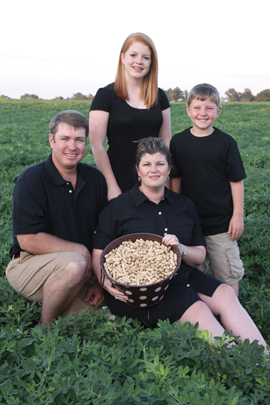OYFF: Despite Challenges, Adams Family Will Keep Workin’ For Peanuts

It’s only a 20-minute drive from Thomas Adams’ home to the “Peanut Capital of the World,” but it’s less than 20 yards to the peanuts that have kept his family farm going for generations.Rows upon rows of peanuts wrap the fields beside his new brick home in a thick, green blanket, jutting up against a lush lawn littered with white golf balls — evidence that the rains that first delayed planting have now delayed harvest.But Thomas wouldn’t have it any other way. Despite all the challenges, peanuts are still king with him, too.So it’s not surprising that Thomas, wife Farrah, daughter Elizabeth (who turns 14 on Nov. 29) and 7-year-old son, Emery, captured the Peanut Division of this year’s Outstanding Young Farm Family contest and are among six finalist families vying for the title which will be awarded Dec. 6 at the 88th Annual Meeting of the Alabama Farmers Federation.With about half of all peanuts in the United States grown within a 100-mile radius of Dothan, the city can rightfully lay claim as the “Peanut Capital of the World.” And the Adams’ Henry County farm — a partnership between Thomas and his parents — are certainly contributing their fair share.This year, a poor price outlook prompted the Adamses to cut back from 850 acres to 700, turning over the more marginal land to grain sorghum which will either be sold to neighboring farms or used as feed for their 120-head commercial cow-calf operation. “If the price would’ve been high, we would’ve planted peanuts,” Thomas says.Diversity comes from the 650 acres of cotton and 200 acres of peas, butterbeans and other vegetables that make up the family’s thriving AgriFresh Produce operation, which counts Whole Foods among its customers.Yet, no matter what troubles or trials may come along, Thomas says peanuts are still a fairly good decision. Even last year, when a salmonella outbreak in Albany, Ga., struck an industry already weighted down with a huge surplus of inventory, the Adamses enjoyed their best crop ever. “We’d forward contracted all of our peanuts, and it was the best price since the quota system was done away with,” says Thomas. “That was the only saving grace.”This year, the forward contract price wasn’t so great. “We didn’t feel like we had a choice,” he said. “We kept holding out for more money, but pretty much the consensus was, ‘This is all you’re going to do. Take this.'”So, the Adamses took it, largely because they can’t bear the thought of not growing peanuts.”Peanuts have been good to us,” Thomas said. “We can pretty much count on them, year in and year out. I don’t foresee us ever quitting peanuts as long as we can find a market for them. I grew up on this farm and peanuts were the main crop and still are. There are years when grain will beat them, and years that cotton will beat them, but peanuts brought us to the dance, and we’re going to stay with them. They kept us here anyway.”Thomas is the fourth generation of Adamses to farm this land. Even today, his 80-year-old grandfather, Elton Adams, still plants and plows peanuts.And when harvest time draws near, Thomas joins his grandfather and father, Don, in the field to pull samples for the traditional hull-scraping to determine the crop’s maturity and optimum harvest time.”It’s a good feeling,” Thomas says of the scraping summit, “but it also concerns me because I just hope that this will continue to be a way of life in our area. If either one of my children want to farm, I hope there’s a farm still here for them. There’s a lot going against farmers right now.”He admits that tradition has fueled his “loyalty” to peanuts. “There have been years where we felt like we were planting peanuts just because we’ve always planted peanuts,” he says. “But at the end of the year, we were proud that we planted them.”Farrah, who works fulltime with a Dothan hotel development company, says her peanut duties are limited to runs for food and equipment parts. “I try to touch base with him on the way home and bring him something to eat or if he needs equipment parts, I’ll pick those up,” she says. “I usually brown bag it at the John Deere place.”During the summer months, she and the kids stay busy at the family’s produce stand where they sell direct to the public.”People would buy one or two bushels of peas and then come back and buy six or seven more!” Farrah marveled. “Thomas would come home and say, ‘What are these people doing with all these peas?!’ If you’d told me this time last year that people would actually buy that stuff, I wouldn’t have believed it. But they really did. We had a hard time keeping it stocked.”Plus, Thomas just recently added another new product to the stand’s offerings — peanuts. “Peas and butterbeans are our big calling card,” he says, “but we’ve just added boiled and green peanuts. When you look at the money there compared to what we sell green peanuts for commercially, there’s a big difference. It’s going well enough that next year, I’ll probably plant some peanuts earlier to try to get some ready for that.””I don’t see it as something that’s going to keep our farm afloat,” he adds, “but anything to turn a dollar helps. Everything helps in this tight market.”Yet, as Farrah pointed out with a laugh, Thomas’ love for peanuts had one drawback.”For awhile there,” she said, “he was eating up all his profits.”
